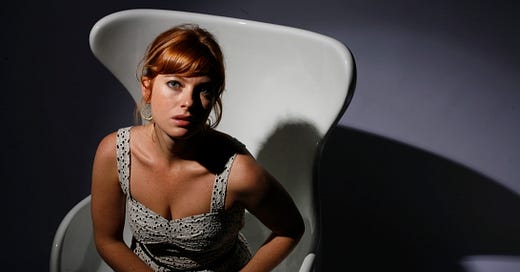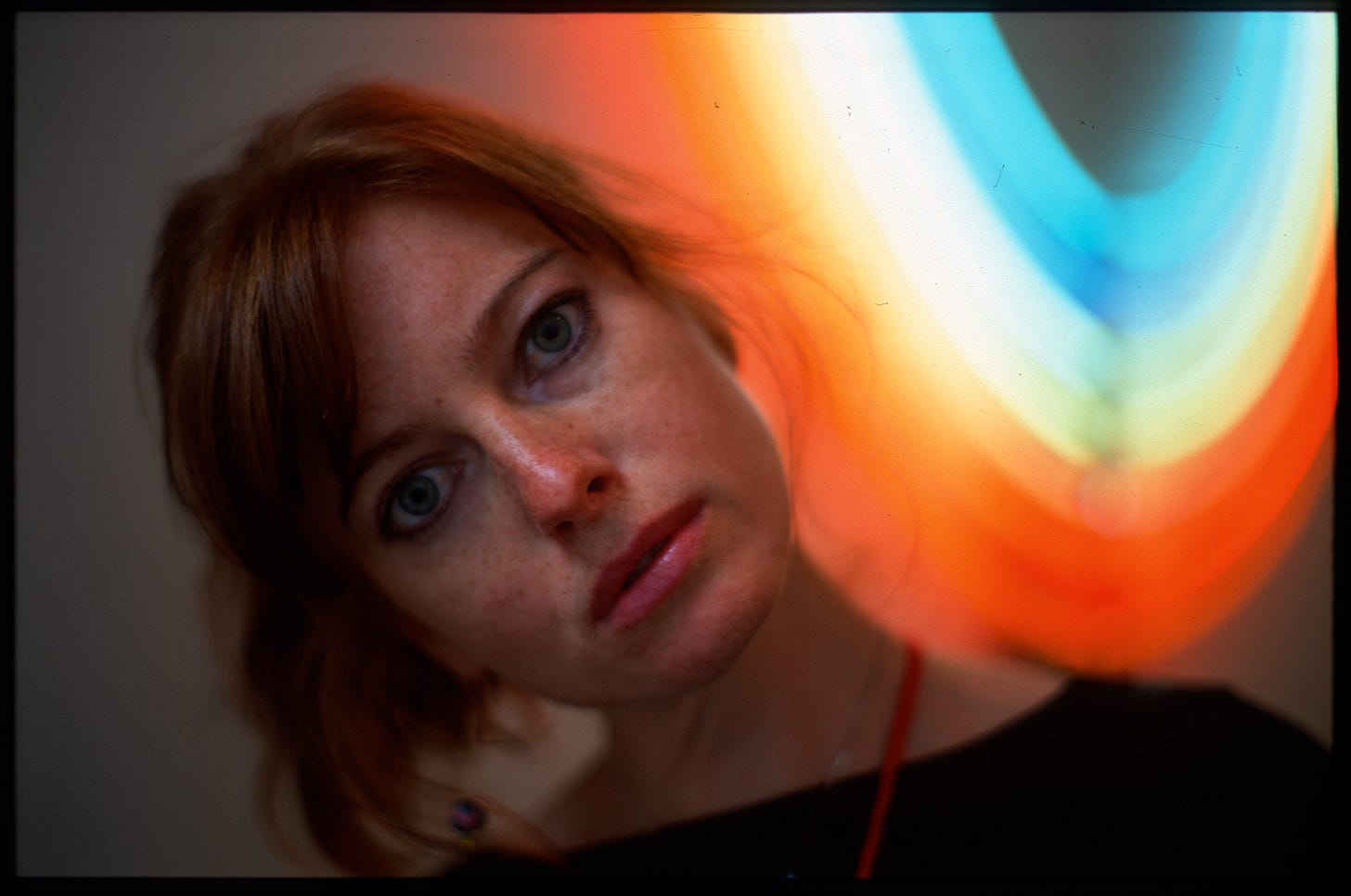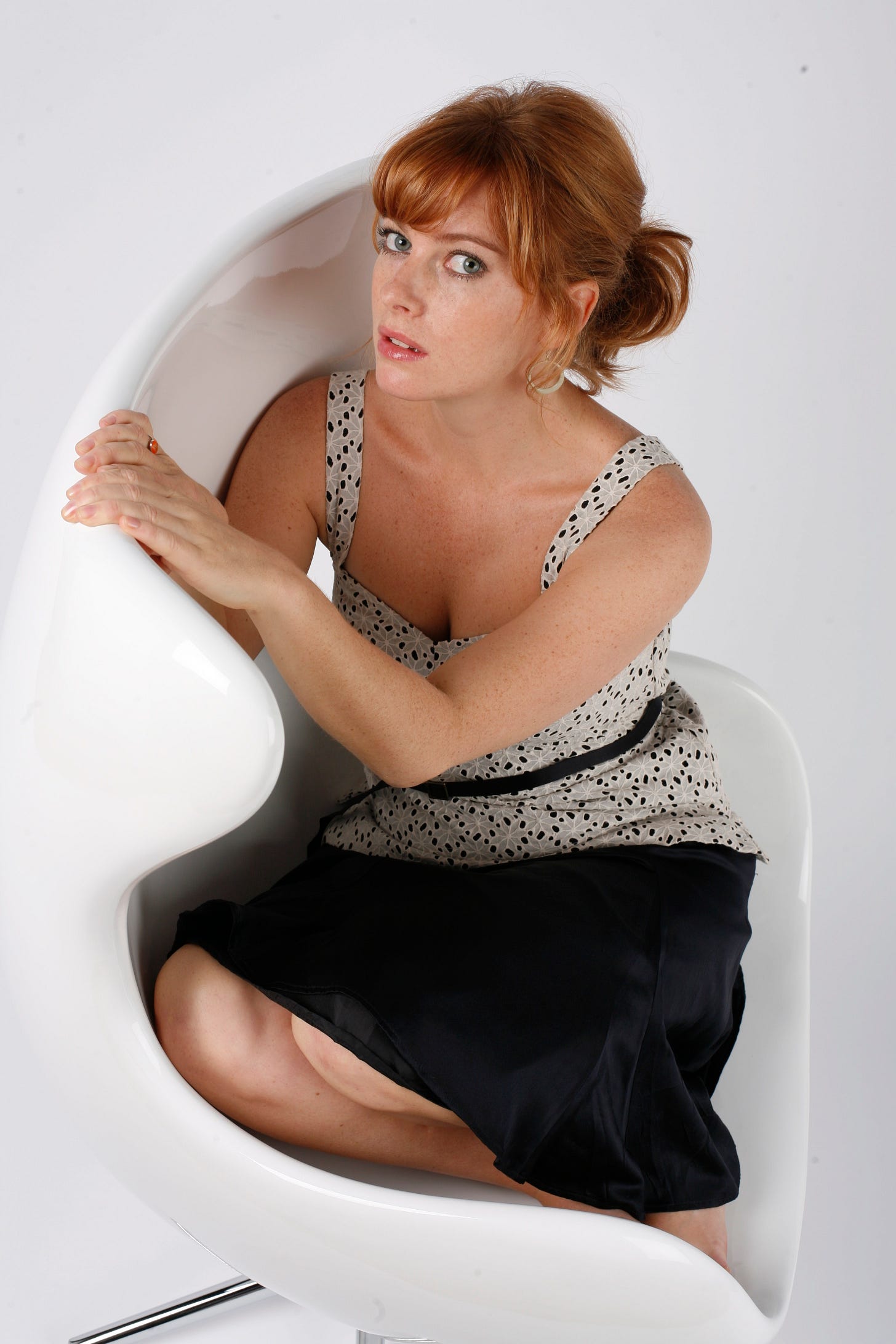An Interview with Kirsten Morrell - INTERVIEW
With the release of her latest single, Avignon, Kirsten Morrell talks to Bin Juice about how living in Europe has shaped the next phase of her musical journey.
Kirsten Morrell joined us in the Basement Green Room to discuss her new solo project, Avignon. With its campy disco aesthetic, it’s a playful insight into Morrell’s journey since her chart-topping success with Goldenhorse. She discusses the value of slowing down, which she practices through Singing Tree Yoga, and how her experiences in Europe have shaped her new sound and philosophy on life.
A. Tell me about taking your first steps in the music industry in New Zealand.
K. I auditioned out of school for a huge musical, and got into a show where I had to dance eight shows a week for two years, and holidays were few and far in between. In fact, I know this, because it's etched in my memory, there was only a two week holiday. I started singing in choirs. I got the choir bug when I was about five years old in Cornwall, because there's a counties choir scene there. And if you go to any county normal school, you sing in a choir. It's just what you do. It's good for you, makes you feel good, gives you lots of friends and community spirit.
K. That was an incredible musical basis, because Marion James, the music person there, would take us on tour. We would drive to Truro Cathedral and perform and compete in this crazy counties choir scene.
K. But in New Zealand, I was lucky enough to take myself out of a college that wasn't very liberal, and Trevor Thwaites and Jonathan McEwen were the most groundbreaking, amazing teachers there. Jonathan was blind, and Trevor would wax lyrical. We were taught everything aurally. It was a bit like being at university, to take notes and to digest and sort it all out.
A. Was it quite a shock to the system learning music in that way?
K. It was totally natural. That's why schools like that are just brilliant, and why the charter system doesn't work. It's an alien landscape that this government's pushing. And it is quite interesting, because having a good musical foundation in your high school years is a really good step to towards something bigger. It kind of shapes your brain in a certain way.
A. So what do you think is the value of music education?
K. Unquantifiable. It's like [Basement Theatre], right? It got started up by my friend Sharyn Duncan. We didn't know what Sharyn was doing in her spare time, but she was looking at Auckland spaces. She had these incredible ambitions at the age of 18, and she did it. And here it is, and it's blossomed into a gorgeous theatre that has all sorts of productions and events, and it’s a safe space for young people to socialise and hang out.
A. Moving on from high school, did you study at university?
K. Yeah, I did. I didn't, and then I did. I got straight into theatre professionally, I worked for a couple of years, then I took a year off because I felt remiss. I hadn't had my OE, so I did a quintessential Kiwi OE around Europe. I got myself around the UK on $35 a day, including accommodation.
A. How is it possible?
K. There are ways — and there are still ways!
A. So moving onto your time with Goldenhorse. How did it lay the foundation for the next iteration of your musical journey?
K. Good question. That word iteration — it is an iteration. That's how I feel it. This whole album, I have collaborated on it. Geoffrey Maddock, my co-writer from Goldenhorse, has collaborated on a song. Alan Gregg, the bass player from the Mutton Birds, who's still in London — we collaborated. Then getting Clint Murphy on board as a Producer, that was a real collaborative way in. Unless I'd had a background in recording, being quite an experienced recording artist, it would have taken a lot longer, and it would have been a more hectic journey.
K. It was just really plain sailing for me. I got back to New Zealand. I got a job. My director made time for it — I just sort of said, I've got to record this album, and I've got some great opportunities to work with people that are really proficient, and really amazing people. Now's the time. And he was like, “Yeah, okay, we can make that space for you.” If I hadn't had that professional background, I wouldn't know to ask those questions.
A. Did you record this project here in New Zealand, or was it still while you were in Europe?
K. A bit of both. The demos started in London, and so did the writing. I did the writing both sides. This new album, I started recording in London, in a friend's lofty spare room. And then coming back to New Zealand… as artists, as soon as someone says no, it hurts. Don't mistake that. You know, we're not robots, but we get so many no's. And I just want to encourage people, when in the face of adversity, to just keep going. Just keep channeling whatever it is that makes you feel positive about life and the world at the moment.
A. I'm really interested to know about the experiences that you had in Europe that have shaped the album.
K. I'm really into visual art. I was born in an area called Camden, North London, and it's really arty. It's really multicultural. When I was growing up there, it was really well equipped in terms of the arts, with musical instruments in schools, street fetes being organised all the time, and real community spirit. I recently got into the fabulous London design movement that's taking shape there. It's like a balm to all the soreness of the world at the moment. You know it's taking on issues, politics, and it's visualising it in location, putting it into the city. So, you know, lots of free spaces, loads of colour, lots of just joy and happiness — bringing it back into a city that I don't think ever lost it, even with some horrendous things that have happened in the last five years in London. Now it's got a heart of its own!
K. I guess I've always been a bit like that artistically, when I'm producing, when I'm creating albums. Like Riverhead was all about Geoffrey and I, but the whole band was into Art Nouveau. It's like, when you want a particular colour car, and you haven't got it yet, and then all you see is that car when you’re out and about — art movements are like that for me.
A. That would have filled you with quite an impassioned creative energy.
K. Yes, and no. So I was reading this chapter, and I think it was in a Voltaire book. But did you know redheads were, at one point thrown in with handicaps and hunchbacks. We were kind of like the dregs of society. In Paris, I think it was the 17th century, Parisian society looked down upon redheads.
A. That's quite fascinating, because the new single that's out is called Avignon, which is obviously a place in France.
K. Avignon — I've got a collection from postmodern French poets, and I was scanning it for lyrics. I just plucked an idea out of it and pivoted on that. “Listen to the young people.” Basically, I sort of threw that in the mix, but then also I had a friend who had written a symphony, and he got it played in Avignon. I sort of threw that into the mix as well. But yeah, Avignon on this album is a real fabulous London moment. It's like a cultural melange. I think I've got some French ancestry. If you look at my dad's nose, I've definitely got some French ancestry. My family are fluent in French. My stage name is French, and that's been plucked out of a family bible somewhere.
K. It's a bit of a co-city song. So I kind of laugh at Paris. It's like, I'm jibing Paris because we're in Avignon.
A. You spent six and half years in London — what was it like coming back to Auckland?
K. Well, let's say Auckland a year and a half ago, because right now New Zealand's not in a good situation. A year ago, I thought, I’m so happy to be back. It's safe. It's paradise. It's beautiful. It's got incredible people doing incredible things. And it's much slower paced than the UK. It's much more spiritually grounded as well.
K. Weirdly, there's a sort of pull that Auckland has — I definitely felt it. The fact that we're surrounded by the sea, and we're so lucky to have indigenous and Pacific cultures.
A. So surveying the local music landscape, what stood out to you?
K. A difficulty to reconnect. My friends who are musicians are all doing multiple things. I feel that I have a responsibility to not move as quickly as I did with Ultraviolet [the first studio album], because I didn't get the time to do it justice. That's my aim — to really just take it easy, because there's a lot of sharks out there.
A. That's also really good advice — to go at a pace that you're comfortable with.
K. Well, there's a lot of injured and ill artists, and I've got to look after my voice. My voice is number one. It's shocking the amount of nodes and vocal problems — it’s really bad that it's so common.
A. Are there any artists who get you excited about being back?
K. Well, all the musicians I've collaborated with so far, definitely! There's a lot of good jazz going on at the moment, like my friend Caitlin Smith. I just saw her play the other night — gorgeous! I want to see Benee. She's an interesting artist. There's a bunch of Wellington bands that I missed out on seeing because I was on tour with Goldenhorse, just before we took this hiatus. I'd love to see those bands live.
A. Are there any particular lessons that you think the New Zealand music scene could learn from London?
K. I'd say my advice would be, in the face of adversity, just look after yourself to begin with, and just make sure you've got a solid plan in place. I've crossed over into the classical music world as well, and it's exactly the same for artists circulating that world, that you can just run out of resources anywhere in the world. New Zealand's a good base, where creativity is valued, and has been valued. And there's a lot of places in the world where it's not. You just have to put your brave face on, put your big girl pants on and keep doing the thing you enjoy.







